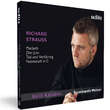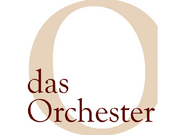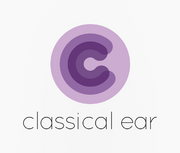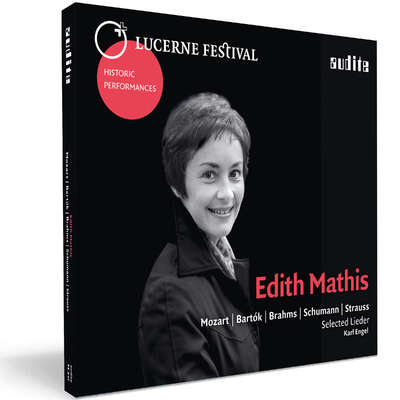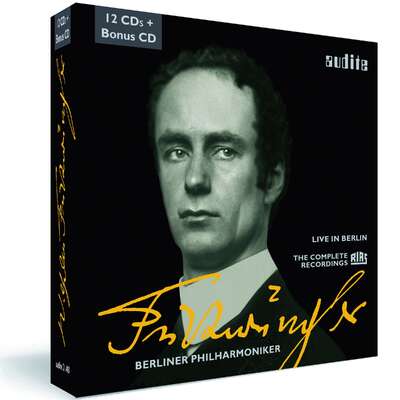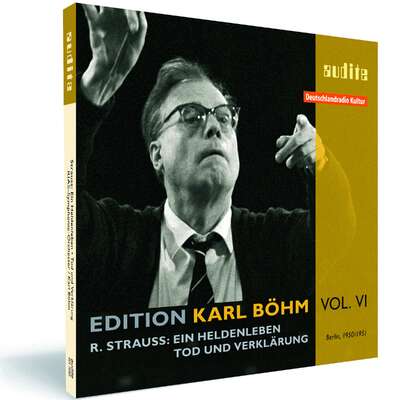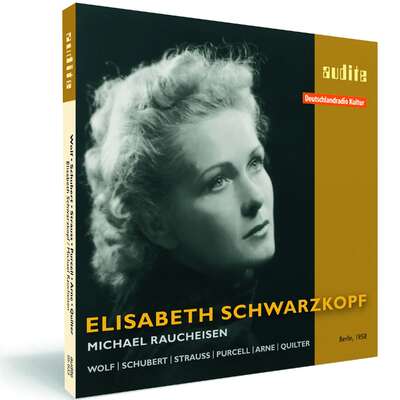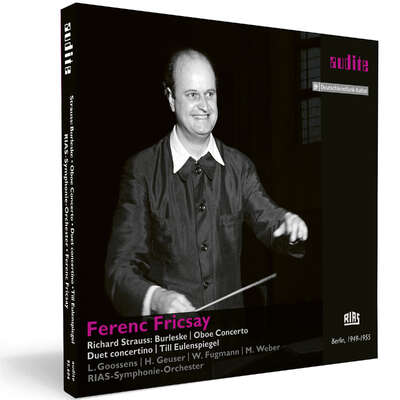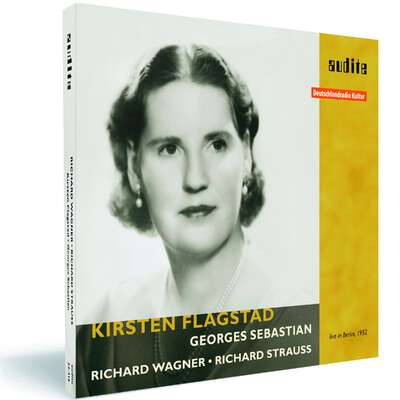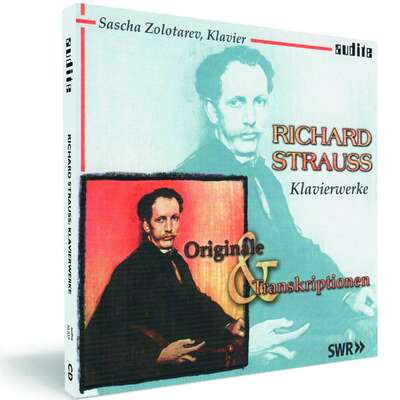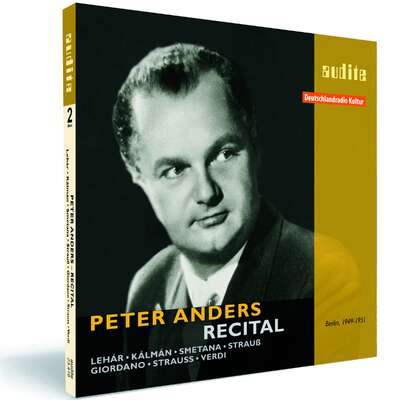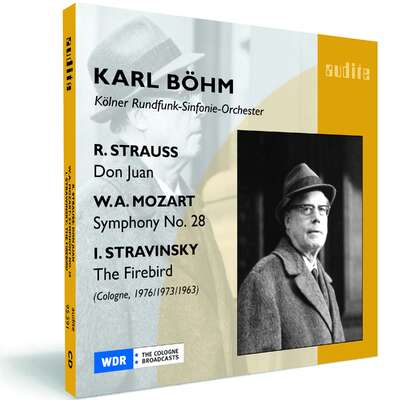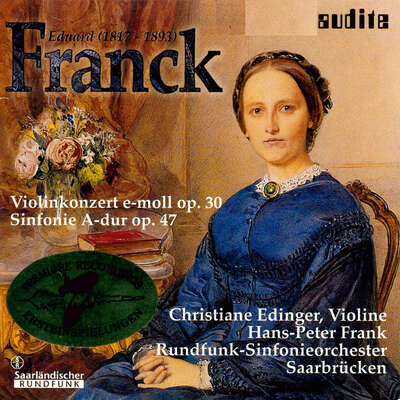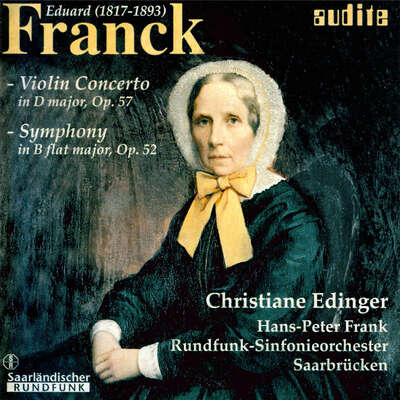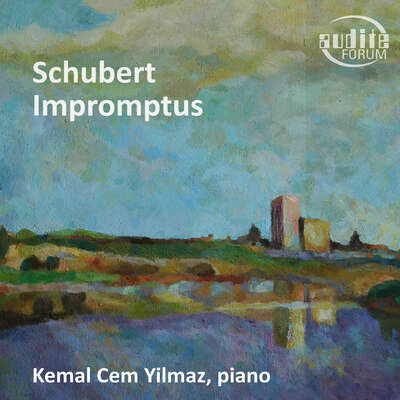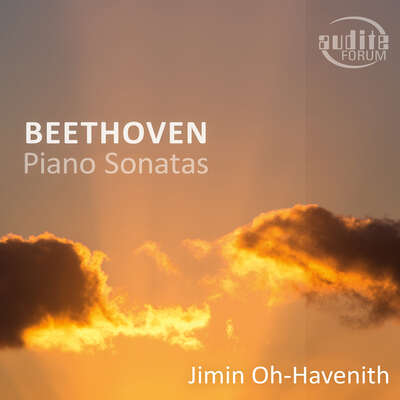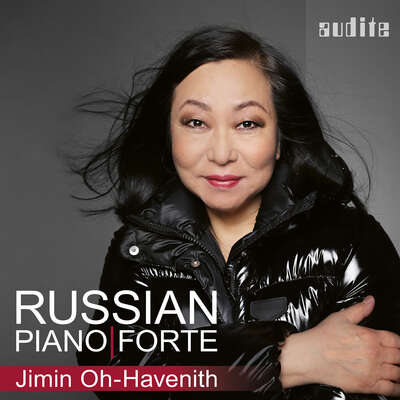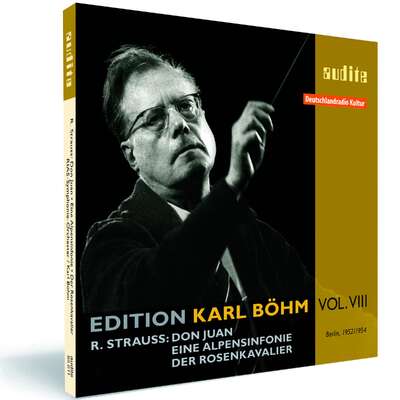
Auto-Rip
When, in 1889, Strauss assumed his office as Grand Ducal Saxon Kapellmeister, he wrote: “To Weimar, where Liszt worked for so long…” Kirill Karabits leads the Staatskapelle Weimar through Strauss’ three early tone poems composed during that time. Strauss himself described these works as “a completely new path”. The contemporaneous Festmarsch is a true rarity.more
"With this Strauss production Krill Karabits proves a great Straussian! The superbly coloured music glows with life and dramatic passion and is electrifying in its energy. The excellent orchestral playing is extremely well captured by the microphones." (Pizzicato)
Details
| Richard Strauss: Macbeth, Don Juan, Tod und Verklärung & Festmarsch in C | |
| article number: | 97.755 |
|---|---|
| EAN barcode: | 4022143977557 |
| price group: | BCA |
| release date: | 4. May 2018 |
| total time: | 70 min. |
Bonus Material
Informationen
Following the release of Prokofiev's Cantata for the 20th Anniversary of the October Revolution, Kirill Karabits dedicates his next audite recording with the Weimar Staatskapelle to the "Weimar" Strauss.
Weimar was not only the metropolis of the classical era that acquired world fame thanks to Goethe and Schiller. Weimar was also the domain of great musicians: Franz Liszt served as Kapellmeister in the city and invented the genre of the symphonic poem. Richard Strauss followed in his footsteps when he, as Kapellmeister from 1889 until 1894, presented his own first symphonic poems, "Macbeth" and "Don Juan", at the helm of the Weimar court orchestra. Kirill Karabits, Generalmusikdirektor of the Deutsches Nationaltheater since 2016, now presents, alongside today's Weimar Staatskapelle, not only these two major works of his great predecessor, but also "Tod und Verklärung", which Strauss had completed in Weimar. The contemporaneous Festmarsch in C major, TrV157 - Strauss' anniversary gift to "Die Wilde Gung'l", the Munich orchestra he had conducted in his youth - is a true rarity, rounding off this recording.
Next month, audite will be presenting "Don Juan" with Ferenc Fricsay and the RIAS Symphony Orchestra in what promises to provide an intriguing historical comparison.
Reviews
Das Orchester | 12/2018 | Franzpeter Messmer | December 1, 2018 | source: https://dasorche...
Diese Einspielung ermöglicht einen neuen Blick und ist nicht nur für Strauss-Liebhaber ein Meilenstein!Mehr lesen
Stuttgarter Zeitung | Nr. 222 | Dienstag, 25. September 2018 | Götz Thieme | September 25, 2018 Strauss-Tradition
Eine außerordentliche Aufführung gelingt hier im Studio, rasant, knackig, mit schallenden Hörnern auf dem Höhepunkt [...] Eine wunderbare Visitenkarte der Weimarer.Mehr lesen
www.artalinna.com | 19 September 2018 | Jean-Charles Hoffelé | September 19, 2018 | source: http://www.artal... Mort et volupté
Karabits fait entendre la modernité drastique du langage du jeune Richard Strauss, exposant ses audaces harmoniques, magnifiant son écriture complexe, aux harmonies chargées : jamais il n’aura été aussi proche d’un certain versant de la Seconde Ecole de Vienne qu’en cette triade que le disque n’avait pas réuni jusqu’alors.Mehr lesen
American Record Guide | September / October 2018 | Roger Hecht | September 1, 2018
Richard Strauss wrote these three early tone poems when he was the Kapellmeister in Weimar, Germany from 1889 to 1894, making these performances homeMehr lesen
This performance presents a real challenge to the classic Rudolf Kempe recording from Dresden, with Karabits a little slower, heavier, and more dramatic than the more open and brighter Kempe. It also has a bigger bass foundation, and the Kempe is not exactly bass shy. Both are great performances, and the engineering of each fits the interpretations. Of the other Macbeths I know, Gerhard Schwarz is very exciting, though I prefer the German orchestras of Karabits and Kempe. Norman del Mar and Mark Elder are good, Elder less so, but neither is up to Karabits, Kempe, and Schwarz.
The Don Juan is slightly brighter in tone—fittingly so—but still rich, muscular, and dashing. The Death and Transfiguration reading produces the eerie and other-worldly sections very well, but where it really impresses is in its sheer power in the sections that call for it, especially near the end, where Karabits stretches out some passages to great effect. The Festival March in C was Strauss’s anniversary gift to “Die Wilde Gung’l”, the Munich orchestra he had conducted in his youth. It is a rarity but nothing special.
The music is dark, muscular, and powerful, full of energy, and built like most of this kind of German music should be, from the very bottom of the orchestra up.
The cover of the booklet is black, with a picture of Karabits and lettering in purple and white. The dominant impression emanates from the black, and that is fitting, because black is the color I associate with these performances. (The disc is purple. It should be black.) The Staatskapelle Weimar sounds like the perfect orchestra for this music. If this is the first of a Strauss tone poem project from them, the result will be formidable and could stand with the Strauss of Rudolf Kempe, Herbert von Karajan, Karl Bohm, etc. It is probably closest to Kempe, but darker and heavier. The sound emphasizes the darkness of the performance. The notes are not extensive, but they tell the basic story of the music well enough.
BBC Music Magazine | September 2018 | David Nice | September 1, 2018
In theory, it was a good idea to show the current shape of Weimar's former Court, now State Orchestra, a fertile training ground for the young RichardMehr lesen
Karabits and his orchestra take a long time to flame, namely through three-quarters of a far from fiery Don Juan, where the crucial oboe solo is outshone by the clarinet towards the end of that exquisite love-scene. But when the sparks fly, which they do, fully, for the first time in the sick-bed agonies of the dying man, there's one performance here to set up there with the best. The memories of youth are beautifully gauzy, too. Otherwise not in the same league as the Staatskapelle Weimar's other Strauss recordings with Antoni Wit.
Fanfare | August 2018 | Steven Kruger | August 1, 2018
I want to be less disappointed than I am. Kirill Karabits recently hit paydirt for Onyx in Bournemouth with powerful readings of the WaltonMehr lesen
Well, for one, the recording sounds very 1960s. Compared to Naxos’s deep Weimar soundstage, Audite has delivered a thin, bass-shy sonority. The Weimar Opera House is made to sound like London’s Royal Festival Hall. That’s not a good thing. Although one manages to make out the bass drum in Strauss’s Festmarsch, it would be hard to avoid. The piece is a Strauss rarity of pre-Elgarian institutional tub-thumping, nicely delivered otherwise. But it would be hard to find supportive low tones and textures elsewhere in this release.
Strauss’s music becomes dramatically less interesting when it doesn’t have a sensual dimension. I was reminded of this almost immediately, as I listened to Macbeth blast away harshly. Karabits actually delivers a fairly sensitive performance, notable for a certain amount of rubato, but the central march doesn’t rise up on grand and noble sonic waves the way it usually does, and one comes away disappointed at the grimness. When we turn to Don Juan and Death and Transfiguration, Karabits brings us standard performances, good ones, not a foot wrong anywhere, but is simply outclassed in every bar by Manfred Honeck and the Pittsburgh Symphony for Reference Recordings, just to name one contemporary.
I originally reheard Honeck’s CDs to verify the missing depth of basses and percussion in this Audite release. And indeed, what a contrast! Heinz Hall makes for massively satisfying, deep and creamy Strauss sonorities. But I was ironically reminded, too, what a difference imagination makes and that mysterious quality Charles Munch used to call “fire.” I came away from the comparison scarcely recalling how Karabits conducted the music. His Don Juan didn’t leap from the balconies, and his old man suffered a rather gray tourist-class ascent to heaven.
I suppose that means this time around someone gives out the old fashioned gentleman’s “C”…
Fanfare | August 2018 | Jerry Dubins | August 1, 2018
Might this be the first in a series of Richard Strauss’s tone poems by Kirill Karabits and the Staatskapelle Weimar, the orchestra he has led asMehr lesen
The album identifies Macbeth (1886–88/1891), Don Juan (1888–89), and Death and Transfiguration (1888–89) as the composer’s “early” tone poems, which they are. Only Aus Italien (1886) is earlier. But in a larger conspectus of Strauss’s output, all but two of his tone poems—Symphonia Domestica and An Alpine Symphony—predate 1900 and could therefore be said to be “early” Strauss. Another way to look at it, though, is through the iceberg analogy. In sheer numbers, Strauss composed most of his works before the turn of the century, yet except for the tone poems and some of his songs, a large portion of his pre-1900 music is not as widely performed or as well-known as are his later works—namely the operas, An Alpine Symphony, the Four Last Songs, and a handful of other pieces.
The connection between the works on this album and the city of Weimar is that Strauss, following in Liszt’s footsteps, served as Kapellmeister there from 1889 to 1894. All three of these tone poems, Death and Transfiguration, Don Juan, and Macbeth, the latter in its revised form (1891) were all premiered by Strauss at the helm of the Weimar court orchestra. Strauss’s Festmarsch, TrV 157—I give the Trenner number here because Strauss wrote half a dozen works with Festmarsch in the title—is not a tone poem, nor does it have anything to do with Weimar. It’s included here simply because it was composed in 1888, just prior to the composer’s Weimar Kapellmeister appointment.
The so-called Wilde Gungl was a “waltz” orchestra founded in Munich by Josef Gungl in 1864. I imagine it was something like the Lawrence Welk band that flourished in a variety TV show from 1951 to 1971. Strauss played violin in the Gungl orchestra from 1882 to 1885, which was then led by Strauss’s father, Franz. To celebrate the orchestra’s 25th anniversary, which was to take place in 1889, Richard Strauss composed the Festmarsch in 1888, and the piece was presented in Munich for the orchestra’s 60th concert. Only 60 concerts in 25 years suggests that the Wilde Gungl was an occasional ensemble whose musicians were otherwise employed.
Of the three tone poems given here, Macbeth is the only one with fewer than 100 recordings—way fewer—which says something about how unpopular it is compared to the others. Comparing versions of Don Juan and Death and Transfiguration would be an exercise in futility. So I will just say this: These are works that demand the highest level of virtuosity from an orchestra’s musicians. The players of the Staatskapelle Weimar make a valiant effort, but they are not quite up to the standards of ensembles such as the Bavarian Radio Symphony Orchestra under Mariss Jansons or the Pittsburgh Symphony Orchestra under Manfred Honeck, both of which have recently given us some stunning Strauss releases. You can hear the Weimar’s violins scrambling a bit to hit all of the notes in some of the rapid, high-lying passages, and coordination between the orchestra’s sections is not all it could be. I haven’t heard it, but if, for some reason, having all three of these “Weimar” tone poems together on a single disc appeals to you, you might want to check out Johannes Fritzsch’s Naxos recording with the Queensland Symphony Orchestra. It doesn’t contain the Festmarsch, which isn’t related anyway, but it does look to be a fairly recent release.
I expect that most fans of Strauss’s tone poems will not find the conjoining of these three particular works a strong incentive to purchase this release, and will be just as happy with recordings that pair the tone poems in different combinations, especially if the performances are preferable.
Gramophone | August 2018 | Hugo Shirley | August 1, 2018
Though one of Germany’s oldest orchestras, the Staatskapelle Weimar has never been a major presence on disc. Just over a decade ago, though, NaxosMehr lesen
This fact is underlined in this fine new recording under Kirill Karabits, who has been juggling his job as music director in Weimar with his post at the Bournemouth Symphony Orchestra since 2016. It’s an interesting programme, too, offering the early (though subsequently revised) Macbeth, plus two scores that brought breakthroughs in their different ways: Don Juan and Tod und Verklärung. The occasional Festmarsch makes a welcome filler.
The virtues familiar from those earlier discs are apparent here in an orchestral sound that is rich and vibrant, with lively strings, rounded, warm brass and characterful woodwind – and Audite captures the sound most satisfyingly at the Weimarhalle. Karabits shows himself to be a very respectable Straussian, too, offering a beautifully paced, brawny and broody reading of Macbeth. It’s a performance that’s powerfully driven and characterised by impressive sweep and biting conviction; though it’s certainly not rushed, and the conductor takes plenty of time for that yearning climax that marks the score’s halfway point (at around 10'10" here).
Don Juan is hugely enjoyable, with plenty of sensuality (listen to that first romantic episode around three minutes in, with the harp nicely audible) and bristling élan – the strings really dig in to their tremolandos accompanying the final return of the big horn theme (at 14'27"), for example. Karabits turns in a rousing account of Tod und Verklärung, too, although for me it doesn’t quite match the warmth and lyricism of Sebastian Weigle’s terrific recent Frankfurt account (Oehms, 2/18). The Festmarsch is not a piece to return to often, perhaps, but it’s rousingly presented here in a rare outing on disc.
So what are the drawbacks? For all the disc’s enjoyability, one notices that that Weimar orchestra doesn’t always command the same sharpness and clarity of some of its more glamorous German competitors, with some details occasionally getting lost. But there’s still an enormous amount to like in these vivid, committed performances.
Fanfare | August 2018 | Huntley Dent | August 1, 2018
No one, including the conductor, orchestra, and record label, is setting out to rival the great recordings of these Strauss selections. KirillMehr lesen
What interested me, besides the pleasure of meeting up with familiar masterpieces, is the historical perspective offered by a program that unfolds in chronological order. Macbeth (1886–88) would be considered a formed, successful work by the standards of the Lisztian tone poem, from which it gains loose organization and a good deal of bombast and rum-tum. But the miraculous breakthrough of Don Juan was in the offing, which makes Macbeth only a stepping stone. No one fully succeeds in turning the score into a silk purse, yet it isn’t entirely a pig’s ear, and Karabits, without revealing any new insights, negotiates the music nicely enough. As in the past, I don’t recognize a hint of Shakespeare’s characters in Strauss’s musical portraiture—the title could just as well be Captain Hook and the Lost Boys.
The stakes are raised in the two masterpieces on the program, Don Juan and Death and Transfiguration (both 1888–89), considering the numerous great recordings each has received. Delivering the music with sumptuous virtuosity is something the Staatskapelle Weimar simply doesn’t have to give. But Karabits knows how Don Juan should go, with brio and panache, and he leads an enjoyable reading. (Come to think of it, how many Slavic conductors have ever triumphed in Strauss, even the most distinguished?) By not aiming for thrills, Karabits may be acknowledging the limitations of his musicians, or perhaps he hears Don Juan with less swagger and more nostalgia.
By the time Strauss began Death and Transfiguration in the summer of 1888, he had completed his transition from abstract music, which held the highest prestige in the long shadow of Beethoven, to program music, which had been considered facile “Nature painting” aimed at unsophisticated listeners, although Bach and Handel stooped to it—the criticisms seem pointless to us today. Don Juan is so perfect that by comparison Death and Transfiguration seems more than a bit cloying and mawkish in tone. I don’t know of many recorded performances that evoke true dignity in the presence of death and awe at the miracle of transfiguration, but perhaps I want what isn’t there in the score. As with Don Juan, Karabits gives us a performance characterized by more reflection and calmness than usual. This renders his reading a little underplayed and inert emotionally.
Finally, there comes a bit of early incidental music, the Festmarsch in C (one of several pieces Strauss composed under the same title, including his op. 1). Being from 1884, this obscure work is out of chronological order. One hears hints of the Prelude to act I of Die Meistersinger; otherwise, Strauss composed a richly scored Prussian march of the kind usually reserved for brass band, adding a lyrical section in the middle. There’s zero indication, to my ears, of the mature composer except in the grandiosity of the Festmarsch’s conception. Pleasantly stirring while it lasts, the music leaves no lasting impression.
The market for this release is hard to fathom, but I doubt that seasoned collectors will take an interest. Karabits is doing better work in other repertoire, especially Russian music of the 20th century.
Fono Forum | August 2018 | Andreas Friesenhagen | August 1, 2018
Von Oktober 1889 an amtierte Richard Strauss für fünf Jahre als zweiter Kapellmeister am Hoftheater in Weimar, eine Zeit, in der auch die dreiMehr lesen
Um davon überzeugt zu sein, reicht es schon zu hören, wie mitreißend plastisch der Todeskampf des Protagonisten in "Tod und Verklärung" geschildert ist, wie greifbar etwa die sich nach oben reckenden Figuren der tiefen Streicher zu Beginn des Allegro-Teils das Aufbäumen des Sterbenden nachzeichnen. Karabits belässt es nicht beim Schönklang, er schöpft das erhebliche Konfliktpotenzial der Musik aus, lässt wilde Schmerzattacken in die Erinnerungen des Helden an schönere Tage hineinfahren. Umso erfüllter wirkt die finale Verklärung. Das ist zugegebenermaßen kein Strauss für Anhänger sublimierter Gefühle – die dem Komponisten hier aber wohl auch nicht vorschwebten.
Den etwas älteren, immer noch zu selten gespielten "Macbeth" inszeniert Karabits düster brodelnd, eruptiv, als Drama mit wenigen Lichtblicken. Was Wunder, wenn auch im "Don Juan" nicht der strahlende Verführer im Mittelpunkt steht. Karabits scheint dem Nimbus dieser Figur zu misstrauen, die Farben wirken gedeckt, die Kantilenen müssen sich gegen die Nebenstimmen behaupten. Der Ukrainer akzentuiert auch hier die dunklen Untertöne, ohne dem indes die Leidenschaft zu opfern. Sein Bekenntnis zur Heterogenität dieser Musik lässt ein komplexeres Bild des Don Juan entstehen, als man es vielleicht gewohnt ist.
Der harmlose Festmarsch in C – zwischen "Don Juan" und "Tod und Verklärung" entstanden – ist eine verzichtbare Zugabe.
classical ear | Mon 09 Jul, 2018 | Andrew Achenbach | July 9, 2018 | source: http://www.class...
On this finely engineered Audite release the orchestra's current principal conductor, Kirill Karabits, presides over a set of Strauss performances that are lucid, watchful and judiciously paced, boasting plenty of well-scrubbed detail from the low winds and strings in particular.Mehr lesen
Deutschlandfunk | 08.07.2018, 9.00-9.30 Uhr "Die neue Platte" | Uwe Friedrich | July 8, 2018 | source: https://www.deut...
Der Weimarer Strauss
Kirill Karabits dirigiert Staatskapelle Weimar
Bach und ganz besonders Liszt – das sind die Komponisten, die man in erster Linie mit Weimar verbindet. Aber auch Richard Strauss hatte seineMehr lesen
Gerade mal 25 Jahre alt war Richard Strauss, als er im Jahr 1889 Kapellmeister des Großherzogs von Sachsen-Weimar-Eisenach wurde. Nach einer eher unglücklichen Zeit am Münchner Nationaltheater kam er nun an die Wirkungsstätte von Franz Liszt. Mit der Weimarer Hofkapelle, heute Staatskapelle, konnte er seine ersten, noch in München entstandenen Tondichtungen "Macbeth" und "Don Juan" uraufführen sowie das in Weimar vollendete Werk "Tod und Verklärung". Der aktuelle Nachfolger von Franz Liszt und Richard Strauss, der ukrainische Dirigent Kirill Karabits, hat nun mit demselben Orchester diese drei frühen Tondichtungen eingespielt und beim Label audite veröffentlicht.
Musik: Richard Strauss, Don Juan
Der Beginn von "Don Juan" lässt auch heute noch Orchestermusiker schwitzen. Das kraftvoll aufstrebende erste Thema ist Zeichen der Männlichkeit, der Vitalität, der Potenz des ewigen Verführers – und sehr schwer präzise zu spielen. Simon Rattle gab jungen Dirigenten einmal den Rat, das Podium möglichst schnell zu stürmen und noch im Auftrittsapplaus loszulegen, damit niemand mitbekommt, wenn der schwierige Einsatz verwackelt. Das hat Kirill Karabits gar nicht nötig, denn die Weimarer Staatskapelle spielt extrem präzise und schwungvoll. Die dahintersteckende Arbeit ist den Musikern nicht anzuhören, dabei gilt noch immer, was Richard Strauss nach einer Weimarer "Don Juan"-Probe an seinen Vater schrieb:
"Das Orchester pustete und keuchte, machte aber seine Sache famos. Ein großartiger Witz! Nach dem "Don Juan" saß ein Hornist schweißtriefend, ganz außer Atem da und seufzte: "Du lieber Gott! Was haben wir denn verbrochen, dass du uns diese Rute (das bin ich) geschickt hast? Die werden wir so bald nicht wieder los!" Wir haben Tränen gelacht. Dabei haben gerade die Hornisten mit Todesverachtung geblasen."
Musik: Richard Strauss, Don Juan
Mit großer Lust am luxuriösen Klang spielen nicht nur die Hörner, sondern auch die Streicher der Weimarer Staatskapelle die lebensfrohen Aufschwünge, mit denen Richard Strauss seinen Don Juan charakterisiert. Er orientierte sich an einem Gedicht von Nikolaus Lenau, der den unermüdlichen Verführer schließlich an Verdruss, Lebens- und Selbstekel sterben lässt. Das ist Richard Strauss’ Sache eher nicht. Zwar endet seine Tondichtung verhalten, bis dahin schildert der Mittzwanziger seinen Helden aber vor allem kraftvoll hochfahrend und genießerisch. In dieser Komposition findet Strauss seinen eigenen Ton, seinen wiedererkennbaren Orchesterklang und einen musikdramaturgischen Aufbau, den zu beschreiben noch Generationen von Musikwissenschaftlern Probleme bereiten würde. Ist es ein Rondo? Ein verkappter Sonatenhauptsatz? Irgendwas dazwischen oder doch etwas ganz Neues? Dem Dirigenten Kirill Karabits scheint das ziemlich egal zu sein, er nimmt sich die nötige Zeit, die Themen auszubreiten und zieht an den dramatischen Stellen fast unmerklich das Tempo an, ohne den rastlosen Liebhaber zu sehr zu hetzen.
Musik: Richard Strauss, Don Juan
Komponist auf der Suche
Die drei Tondichtungen "Macbeth", "Don Juan" und "Tod und Verklärung" entstanden in einer wichtigen Phase in der Karriere von Richard Strauss. Der legendäre Dirigent Hans von Bülow, Wagnerianer der ersten Stunde, hatte Strauss nach Meiningen geholt, wo er das Dirigieren lernte und Johannes Brahms traf. Von dort kehrte Strauss in seine Heimatstadt München zurück, wo der ambitionierte Jungkomponist mit ersten Tondichtungen die abgenutzt erscheinende Form der Sinfonie überwinden wollte. Mit seinem "Don Juan" sollte ihm das gelingen, im kurz zuvor entstandenen "Macbeth" war er hingegen noch auf der Suche.
Musik: Richard Strauss, Macbeth
Kaum ein anderes Werk hat Richard Strauss so oft und so gründlich überarbeitet wie "Macbeth". Die erste der drei Fassungen schickte er im Januar 1888 an seinen Mentor Bülow, der ihm mitteilte, er könne eine Tondichtung über den schottischen Königsmörder unmöglich mit dem Triumphmarsch seines Widersachers Macduff abschließen. Strauss schrieb das Finale um, und nun endet das Werk düster mit dem Tod des Titelhelden. Später änderte er noch einige Details dieses finsteren Nachtstücks, das allerdings nicht sklavisch den Handlungsablauf bei Shakespeare wiedergibt, sondern vielmehr atmosphärisch dicht die Stimmung der Tragödie einfängt.
Musik: Richard Strauss, Macbeth
"Macbeth" erreichte nie die Popularität der anderen Tondichtungen von Richard Strauss, umso willkommener ist diese ernsthafte, gründliche und bei aller Düsternis doch farbenreiche Interpretation der Staatskapelle Weimar unter ihrem Generalmusikdirektor Kirill Karabits. Gerade im Vergleich mit den anderen beiden Tondichtungen auf dieser CD wird aber auch deutlich, dass Strauss mit seinem "Macbeth" noch auf der Suche nach einer neuen Form war und seine Gestaltungsmittel noch nicht völlig im Griff hatte. Das änderte sich bereits im "Don Juan". Zur Meisterschaft gelangte er spätestens 1889 mit der in Weimar vollendeten Komposition "Tod und Verklärung".
Musik: Richard Strauss, Tod und Verklärung
Zwischen Abonnementskonzerten und Opernaufführungen, die er als Kapellmeister zu dirigieren hatte, gestaltete Strauss nach eigenem Bekunden "die Todesstunde eines Menschen, der nach den höchsten Zielen gestrebt hat". Darin dürfen wir in der typischen Künstlerpose des 19. Jahrhunderts durchaus auch ein fiktives und nicht besonders bescheidenes Selbstporträt des Komponisten in hoffentlich ferner Zukunft sehen. Bei einem 25-Jährigen, dessen Leben bis dahin von Schicksalsschlägen oder schweren Krankheiten verschont blieb, mag das etwas prätentiös klingen, aber ein mehr oder weniger ausgeprägter Narzissmus lässt sich bei Richard Strauss schließlich in allen Lebensaltern beobachten. Anders als in "Macbeth" ist in "Tod und Verklärung" ein genaues Programm überliefert. Vom stockenden Atem des Sterbenden über den Moment des Todes bis hin zum Blick ins Jenseits, wo der Künstler das erschaut, was er auf Erden nicht schaffen konnte. Dieser Moment klingt bereits wie eine Vorahnung seiner "vier letzten Lieder".
Musik: Richard Strauss, Tod und Verklärung
Traditionsorchester mit Luxusklang
Auch den ätherischen Tonfall der Verklärung treffen die Musiker der Weimarer Staatskapelle unter ihrem aktuellen Generalmusikdirektor Kirill Karabits genau, ohne dass die wilhelminische Heilsgewissheit in süßlichen Kitsch abgleitet. Der gefürchtete Wiener Kritiker Eduard Hanslick spottete über "Tod und Verklärung", die Musik sei so plastisch, dass dazu auch eine Pantomime des sterbenden Künstlers auf der Bühne aufgeführt werden könnte und hat damit die Kritik an den trappelnden Pferden in der "Elektra" oder den Orgasmustrillern im "Rosenkavalier" vorweggenommen. Schon zu diesem Zeitpunkt, 1889, steht der fertige Strauss vor uns mit all seinen Stärken, auch mit seinen vermeintlichen Schwächen.
Als Bonus und Rarität hat Kirill Karabits zu den drei Tondichtungen noch ein heiteres Nachspiel angefügt, nämlich jenen "Festmarsch in C-Dur", den Richard für seinen Vater Franz zum 25-jährigen Bestehen von dessen Privatorchester "Die wilde Gungl" schrieb. Eine Gelegenheitskomposition, nichts wirklich Wichtiges. Mit dem großen Orchesteraufwand der Tondichtungen hat diese Kleinigkeit nichts zu tun, aber sie macht den Weimarer Musikern hörbar Spaß.
Musik: Richard Strauss, Festmarsch in C
Die Tonmeister des Labels audite haben das Orchester auch im abschließenden Festmarsch plastisch gestaffelt eingefangen. Die Orchestergruppen mischen sich vor allem in den Tondichtungen zu einem warmen, aber nie erdrückenden Luxusklang, der den Rang eines der ältesten deutschen Orchester unmittelbar beglaubigt. Dass die 1491 gegründete Staatskapelle Weimar eines der wendigsten und reaktionsschnellsten Opernorchester Deutschlands ist, wissen nicht nur Fachleute. Ebenso überzeugend ist sie auf dieser neuen Platte unter ihrem Generalmusikdirektor Kirill Karabits mit Tondichtungen von Richard Strauss als Konzertorchester zu hören. Einziger Wermutstropfen ist, dass diese Zusammenarbeit bereits in der kommenden Spielzeit endet, weil Karabits seinen Vertrag in Weimar nicht verlängert.
Audiophile Audition | June 27, 2018 | Gary Lemco | June 27, 2018 | source: https://www.auda...
Here, for Audite (19-21 December 2017), Karabits has a first-rate ensemble with which to strike out with singularly oppressive tones, “justifying” the un-popularity of this daring, experimental work.Mehr lesen
www.musicweb-international.com | 20.06.2018 | Nick Barnard | June 20, 2018 | source: http://www.music...
In a world of marketing hype and hyperbola the Staatskapelle Weimar can say quite literally that they have the longest performing tradition of anyMehr lesen
Here they are led by their current principal conductor Kirill Karabits. Karabits has been creating an admired discography of mainly Russian/Soviet music with the other orchestra he directs - the Bournemouth Symphony Orchestra. The disc gets off to an excellent start with a very fiery and highly dramatic reading of Macbeth. The liner makes clear that Strauss wrote this very much under the influence of Liszt's model of the symphonic poem right down to his choice of a literary/historical figure for the work. However the liner is also correct in noting that this is not a narrative story told through the medium of the orchestra but rather a character study of the principle protagonist himself. Strauss started working on this piece when he was just 22 completing the first version early in 1888. But criticism from his mentor Hans von Bülow meant that it was not premiered in Weimar in a revised form until 1890. Which is why it appears 'later' in the Strauss catalogue than the other more obviously mature works on this disc. Over the years this has proved to be the least popular of the Strauss tone poems either on disc or in the concert hall. The reason for this are fairly easy to discern; although it remains a remarkable apprentice work it displays little of the unique flair for the orchestra or indeed form or melody that is evident in Don Juan completed later the same year on September 30th 1888. This blossoming of Strauss' unique talent from potential to full-blown mastery in just a few months is one of the great musical miracles.
Karabits' strength here is to play the work for what it is not what it might become. The liner references Strauss describing the music as needing to be "harsh and gruesome" as the subject was "of a very wild nature". By the sensibilities of the 21st century the former description seems somewhat excessive but relatively speaking this is cruder and certainly harsher than most other Strauss works and Karabits it very good at bringing that out. Not that his superb Weimar players are in the slightest bit crude or harsh. The collective sound of this orchestra is an enduring joy. This is built on a fantastically solid and rich bass line - Karabits uses the traditional seating plan with the orchestral string basses to his left behind the 1st violins, the cellos next to the first violins and the 2nd violins to his right. Additionally the brass are stretched across the back of the orchestra [YouTube videos of the orchestra in concert and a brief promotional video of the recording of this disc confirm the evidence of the ear from the CD alone]. The brass and wind choirs are beautifully balanced within themselves and the larger orchestral group. Additionally, the trumpets use rotary valve instruments and throughout there is a real sense of an ensemble continuing a performing tradition. Technically the playing is of a superb level - one imagines Strauss would have been thrilled if only his works had been played at this standard in the 1890's – but it is the sound of the orchestra that makes this one of my favourite ensembles in the world at the moment.
But do not think everything is subsumed into a bed of wallowing tonal allure. Karabits can get the orchestra to play with bite and brio as required as the very opening of Macbeth proves. On disc since the work's inclusion in Rudolf Kempe's renowned survey for EMI in Dresden of Stauss' orchestral works there have been many versions variously coupled some of which I know some I do not. Maazel's earlier VPO recording on DG has something of the thrust that Karabits achieves less so in his Bavarian RSO remake. Zinman in Zurich I rate lower than many in Strauss generally and Dorati in Detroit is just a bit lacking in drama and orchestral brilliance. Del Mar in Aarhus is disappointingly scrappy too. Returning to Jarvi with the SNO underlines the exciting impact the Chandos recording gave these performances but again lacking the last degree of orchestral cohesion. Hard not to hear in Kempe an intuitive understanding of how to pace and phrase this music but the EMI recording really does begin to sound its years and even the remarkable Dresden Staatskapelle of the 1970's cannot beat the sheer collective virtuosity of their Weimar colleagues today.
But the quality of the playing here would count for little if Karabits was not able to tie the whole work together in as convincing a manner as he does. For once this really does sound like the work of a budding genius not just a piece of great promise. Around the 5:00 minute mark I like the way Karabits finds both lyrical flow and dramatic tension that draws the section of the work together. Indeed, throughout this performance it is the sure handling of the pace of the score that impresses right through to the closing glowering pages marking Macbeth's death. So all in all an excellent performance that competes with the best in the current catalogue.
Don Juan that follows is equally technically fine - worth mentioning here that the Audite recording in the sympathetic acoustic of the Weimarhalle is very good indeed. Just in standard CD stereo but the engineers find detail and warmth with the orchestral soundstage clearly delineated whilst providing the collective tonal lustre which defines the orchestra. Don Juan is a staple of every half decent orchestra the world over and of course on disc the competition is ferocious. Karabits is less individual here; the playing is a joy, the music the enduring marvel and tuneful feast it always is but somehow without the headturning individuality I heard in Macbeth. The benefit is a more light-hearted capricious Don Juan than some versions which emphasise the muscular virtuosity of the work. The latter approach is embodied in the famous Solti/Chicago/Decca recording which is as dynamic as it is domineering. But take the melting love theme introduced on the oboe around 6:50 in this performance. This is beautifully played in Weimar - I like the way the recording picks up the muted horns and harp arpeggiations and the oboe itself is lovely. But for a more intimate and touching rendition it is hard to surpass Lothar Koch (I assume) for Karajan in Berlin. The genius here is the tenderness Karajan/Koch brings to a scandalous character, the fractional hesitations suggesting a humanity and vulnerability that is disarming. Perhaps I am over interpreting that but in direct comparison this new version is 'just' beautifully played. Even the famed heroic horn call that follows is played with rock solid power and bravura but just a tad too little flashing-eyed heroism. No-one hearing this performance in isolation will be anything but impressed by the sheer quality of its execution but conversely it lacks the stand-out individuality that made Macbeth such a compelling listening experience.
The third main work is Tod und Verklärung which shows further the developing composer not just in terms of compositional technique but branching out into the realm of the philosophical tone-poem. For a man not yet thirty it seems unlikely that he would embrace the concept about the end of life yet that is what he did. Also, unlike the preceding two works there is a detailed narrative referring to the fevered recollections of a man on his deathbed, his death and subsequent 'transfiguration'. By now on the disc Karabits' interpretational choices as far as Strauss are concerned are becoming clearer. Again this is a sensitive and superbly played performance but it strikes me that Karabits seeks to eschew any sense of sentimentality. A case in point is the beautiful unfolding flute melody that occurs between the two main 'fever attacks' [track 3 9:20] – Karabits allows the flute freedom to phrase but clearly prefers a simpler direct approach. Again worth drawing attention to the quality of the Audite recording which allows all the inner string accompanying detail and those harps again to register. The control of tempo through the following etwas breiter with a well managed poco stringendo shows Karabits' intelligent handling of the structure but come the following appassionato reliving the dying man's former loves and again it is just a fraction too 'placed' for me. The famous Szell/Cleveland recording on CBS/Sony was my introduction to this work. Listening to this same passage there for sure the recording is boxy and constrained in a way the new one patently is not but goodness me Szell finds the sense of delirium and unrestrained passion that is surely what Strauss sought to represent - heresy to say, Reiner in Chicago just seems fast here. Of the more recent recordings I have enjoyed Manfred Honeck in Pittsburgh on Reference but he is generally more interventionist than Karabits so it will be down to the individual listener's tastes as to what they prefer from the podium.
But returning to this new version, whatever passing thoughts one may have about interpretational corners the quality of the orchestra, the marvellously apt collective sound they make and how well this has been caught by the engineering is an ongoing pleasure. As at the last climax of the 'love' music is reached around 15:25 listen to the way the Weimar brass expands to fill the soundstage. But the engineering is equally good at catching the uneven heartbeats on the timps and then through the final spasm of life into death at 17:30 the deep-toned gong is beautifully rendered. No surprise either that this orchestra is perfectly equipped to play the closing 'transfiguration' music with effortless grandeur. Karabits' pacing here is very good indeed; steady but with an inexorable sense of being pulled forward towards the light. Those harps again are allowed to decorate the melodic lines with a gorgeous filigree texture and Karabits' uncomplicated approach pays substantial dividends with the simple dignity of the statement of the love theme now considered in calm recollection at 20:00. Unmannered apt tempi allow the music to unfurl and open out with a visionary radiance that is very impressive. As the vision fades over the closing two minutes of the work the qualities of playing recording and indeed interpretation bring the piece to a very satisfying conclusion.
The addition of the Festmarsch in C that Strauss wrote for the amateur orchestra he used to conduct is indeed a rarity but by being placed straight after the pained ecstasy of Tod und Verklärung the phrase "down to earth with a bump" comes to mind. Of course its well played and of course it is interesting to hear but even the liner describes it as "a mixture of fairground and emperor's birthday" - a brilliant description I cannot improve upon or elaborate. Clearly, the vast majority of collectors will base their decision to buy this disc or not on the main three works and the march will be a bonus, or not.
The stature of the Weimar Staatskappelle deserves to be further elevated by this disc and the value of having this ensemble play these works for the reasons mentioned earlier is clear. Macbeth is a palpable hit, Don Juan very good technically but slightly faceless interpretatively with Tod und Verklärung basically somewhere between the two with Karabits' style perhaps better suited to this work although I think he could afford a little more expressive freedom and impetuosity to balance his clarity and control. Superb playing and engineering ensure this is never less than a pleasure to listen to.
Spiegel online
| 10.06.2018 | Werner Theurich | June 10, 2018 | source: http://www.spieg...
Neuer Schwung, alte Pracht: Klassiker von Strauss und Bartók
Richard Strauss und Béla Bartók liebten das Orchester, jeder auf seine Art. Wie überzeugend frisch ihre Arbeiten noch heute klingen können, zeigen zwei neue Aufnahmen.
Ein klarer Punktsiegt für den Chef und das Ensemble: Weimar 2018 klingt wunderbar klassisch und frisch zugleich.Mehr lesen
Musicalifeiten | 25.05.2018 | May 25, 2018 | source: https://musicali...
Of het werk echt spiritueel klinkt of eenvoudiger banaal, is afhankelijk van de uitvoering. Met dirigenten als Karajan in alle Strauss (DG 447.422-2), Blomstedt in Don Juan (Decca 466.423-2) en Kempe in Macbeth (EMI 769.171-2) is Karabits als huidige opvolger van Strauss met zijn goede orkest uit Weimar een der dirigenten die Strauss alle recht doet.Mehr lesen
Der neue Merker | 21.05.2018 | Dr. Ingobert Waltenberger | May 21, 2018 | source: https://onlineme...
Karabits [webt] nach dem von Strauss exakt vorgegeben Programm einen wie von Gold durchwirkten edlen Klanggobelin.<br /> Fazit: Kirill Karabits setzt mit dieser CD Maßstäbe.Mehr lesen
Fazit: Kirill Karabits setzt mit dieser CD Maßstäbe.
Thüringische Landeszeitung | 10. Mai / 11. Mai 2018 | Wolfgang Hirsch | May 10, 2018
Karabits’ Weimarer Vermächtnis?
Exquisite Richard-Strauss-CD der Staatskapelle – GMD-Vertrag noch nicht verlängert
Karabits arbeitet plastisch und kontrastiv, und so erweckt er schon beinahe expressionistisch zu nennende Tonerzählungen zu sinnlichem Leben [...] Mehr lesen
Radio Klassik Stephansdom | Mittwoch, 9. Mai 2018, 18.37 Uhr | May 9, 2018 | source: https://radiokla... BROADCAST: CD des Tages
Sendebeleg siehe PDF!Mehr lesen
Pizzicato | 04/05/2018 | Remy Franck | May 4, 2018 | source: https://www.pizz... Kirill Karabits – ein herausragender Strauss-Dirigent
Dreizehn Jahre sind es her, als ich eines jener Konzerterlebnisse hatte, die sich einem unvergesslich einprägen. Es war ein Strauss-‘Zarathustra’Mehr lesen
Und nun wiederholt sich die Begeisterung. Karabits dirigiert auf dieser CD eine absolut phänomenale Fassung des ‘Don Juan’, wunderbar differenziert zwischen den einzelnen Teilen, zwischen aufkeimender Wollust und Liebesszenen, unpathetisch, pulsierend, schlank, ungemein farbig, mit vielen sonst überspielten Zwischentönen und mit einer bemerkenswerten Spannung.
Dass es von Karajan bis zu Karabits nicht sehr weit ist, zeigt auch ‘Tod und Verklärung’, ein Werk, das der Chefdirigent der Staatskapelle Weimar dramaturgisch sehr nahe am Programm dirigiert, spannungsvoll-bedeutsam und mit einem Klangraffinement, das einen bloß staunen lässt. Musik derartig mit Orchesterfarben zu inszenieren, können heute nur ganz wenige Dirigenten.
Zum Schluss erklingt der selten aufgeführte ‘Festmarsch’, 1888 komponiert, kurz bevor Strauss 1889 sein Amt als Großherzoglich Sächsischer Kapellmeister in Weimar antrat.
Den Auftakt des Programms macht die Tondichtung ‘Macbeth’, die sehr dramatisch musiziert wird. Gerade in dieser letztlich wenig erfolgreichen Tondichtung kann ein Dirigent sehr viel erreichen, um die Musik auf die höhere Schiene zu heben. Kirill Karabits gelingt das sehr gut, weil er die Episoden perfekt verbindet. Und so entsteht in diesem Werk ein Strömen und Blühen der Töne, das zeigt, dass ‘Macbeth’ sehr zu Unrecht im Repertoire vernachlässigt wird. Dies ist für mich die unbestreitbar beste Aufnahme von ‘Macbeth’, die ich gehört habe.
Die Weimarer Produktion begeistert aber auch durch ein hervorragendes Orchesterspiel und durch einen Klang, der in wirklich idealer Weise vom Audite-Team eingefangen wurde. Derart natürliche, räumliche und perfekt ausbalancierte Tonaufnahmen sind heute eher selten. Das alles und vor allem die Tatsache, dass Karabits sich als hervorragender Strauss-Dirigent aufstellt, lässt den Wunsch nach ‘mehr’ deutlich werden. Mehr Strauss von Karabits aus Weimar!
With this Strauss production Krill Karabits proves a great Straussian! The superbly coloured music glows with life and dramatic passion and is electrifying in its energy. The excellent orchestral playing is extremely well captured by the microphones.
www.opusklassiek.nl | mei 2018 | Siebe Riedstra | May 1, 2018 | source: https://www.opus...
De Staatskapelle Weimar is net terug van een vier weken durende toerneeMehr lesen
Classical CD Choice | April 30, 2018 | Barry Forshaw | April 30, 2018 | source: http://www.cdcho...
Also worthy of attention are a brace of new discs with notable individual qualities. The Audite label has a colourful and idiomatic quartet of readings of Strauss (RICHARD STRAUSS: MACBETH, DON JUAN, TOD AND VERKLARUNG AND THE FESTMARSCH IN C) with the Staatskaplle Wein conducted by Kiril Karabits [...]Mehr lesen
www.wqxr.org
| May 24, 2018 | Zev Kane | source: https://www.wqxr...
The Best New Classical Releases of May 2018
From Monteverdi’s sublime “Vespers” to the bold orchestral imaginings of Richard Strauss, here are our favorite releases of the month.
Kirill Karabits and the Staatskapelle Weimar pay homage to their proud inheritance by leaning into Strauss’s emotional extremesMehr lesen
www.elegantclassics.cz | 20.11.2018 | Miloš Bittner | source: https://www.eleg... Výborná kombinace pro hudbu Richarda Strausse na labelu audite
Pokud je naše duše otevřena, splyne i s pojetím, které se nám od Karabitse dostává. A v kruhu se opět dostáváme k Staatskapelle Weimar a jejím muzikantům. Ti dokáží přednést jak lahodně znějící sóla, tak unisono hru, která se blýská souhrou a příkladným hudebním cítěním.Mehr lesen
News
Also worthy of attention are a brace of new discs with notable individual...
Výborná kombinace pro hudbu Richarda Strausse na labelu audite
Wie „Kapellmeistermusik“ klingen die Tondichtungen von Richard Strauss in...
Richard Strauss wrote these three early tone poems when he was the Kapellmeister...
I want to be less disappointed than I am. Kirill Karabits recently hit paydirt...
No one, including the conductor, orchestra, and record label, is setting out to...
Might this be the first in a series of Richard Strauss’s tone poems by Kirill...
I've enjoyed my previous encounters on CD with the Staatskapelle Weimar, notably...
In theory, it was a good idea to show the current shape of Weimar's former...
Though one of Germany’s oldest orchestras, the Staatskapelle Weimar has never...
Von Oktober 1889 an amtierte Richard Strauss für fünf Jahre als zweiter...
In 1884, Richard Strauss became, through the support of conductor Hans von...
In a world of marketing hype and hyperbola the Staatskapelle Weimar can say...
Neuer Schwung, alte Pracht: Klassiker von Strauss und Bartók
In 1889 aanvaardde Richard zijn benoeming als groothertogelijke kapelmeester...
De Staatskapelle Weimar is net terug van een vier weken durende toernee naar de...
Kirill Karabits, seit 2016/2017 Generalmusikdirektor und Chefdirigent des...
